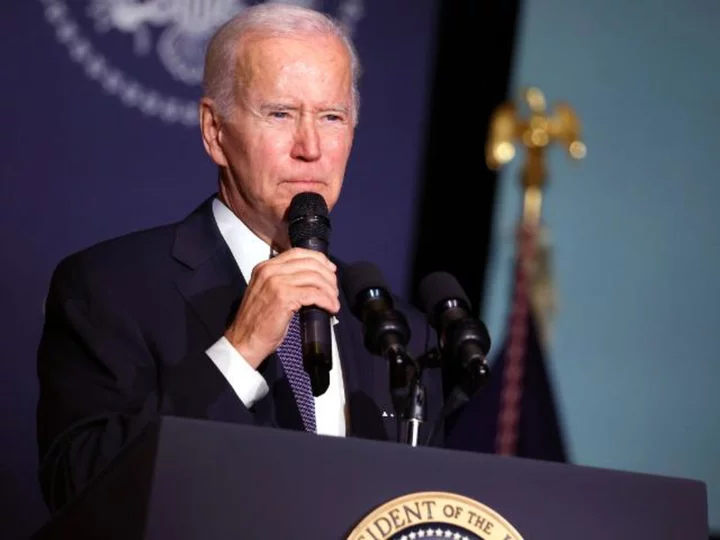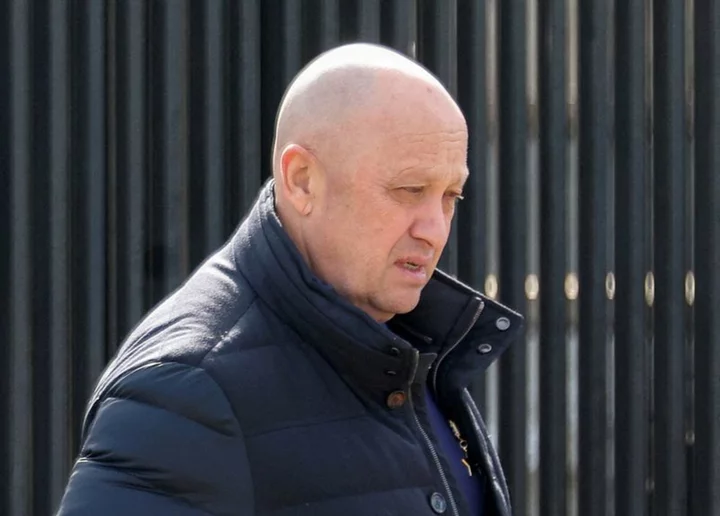When President Joe Biden speaks at a community college in New York on Wednesday, he's expected to hit Republicans hard for budget cuts they are demanding as part of their bill to raise the debt ceiling.
Many of the programs Biden will warn about aren't actually singled out in the GOP bill, which cuts spending across the board. But there's at least one program congressional Republicans are specifically targeting -- and it could change if and how millions of Americans pay back their federal student loans.
The future of Biden's federal student loan forgiveness program will first be decided in the Supreme Court, but even if it survives that challenge, the program and the administration's moves to lower payments for millions of Americans with federal loans are also under attack in Congress.
The House GOP bill would eliminate the federal student loan forgiveness program and block a proposed income-driven repayment plan that aims to reduce monthly payments for many borrowers and lower the total amount of money paid back over time. The new plan is still being finalized, but some provisions are expected to take effect later this year. Unlike the one-time loan forgiveness program, the new income-driven repayment plan would apply to future borrowers as well.
While the Limit, Save, Grow Act has slim to no chance of ever becoming law, it acts as a sort of wish list for some Republicans on Capitol Hill -- and includes proposals that Republicans could try to add to the budget.
"Prior to the student loan pause we had a million people defaulting a year on loans, and often those are people who weren't able to complete college or didn't have the earnings they need to be able to afford to repay those loans," Undersecretary for Education James Kvaal said in an interview with CNN.
"Income-driven repayment plans set your monthly payments based upon your income as a way of making sure that those payments are affordable, and that is a really important option for tens of millions of people with student loans to make sure they can afford their loan payments, and also the other obligations that that they may have in their lives," Kvaal added.
Republicans, including Education and the Workforce Committee Chairwoman Rep. Virginia Foxx of North Carolina, call the income-driven repayment program "radical," and say it would, "turn student loans into untargeted grants and cost more than any other regulation in our nation's history."
The price of the program isn't cheap, with estimates ranging from $138 billion over 10 years by the Biden administration to up to $361 billion over the next decade by the Penn Wharton Budget Model. And some experts argue that the new income-driven plan could result in colleges charging higher tuition and, in turn, lead students to more borrowing.
But for millions of Americans, it could mean the difference between making payments and defaulting, particularly after more than three years of not having to budget for payments.
The Republican proposal would also strip the Department of Education's power to pause student loan payments in the future as it did at the beginning of the pandemic -- during a Republican administration.
Bipartisan beginnings
The student loan repayment pause started during former President Donald Trump's time in office at the beginning of the pandemic. At the time, the Department of Education said borrowers would be able to suspend payments without penalty and without accruing interest for at least 60 days. As the pandemic stretched on longer than anyone expected, so did the pause.
An automatic pause of payments and interest for six months was then included in the $2 trillion economic stimulus package, which had broad bipartisan support. But earlier this year, lawsuits over the pause started and Republican pushback escalated. Foxx called extending the pause "fiscal insanity" and that continuing the pauses had "real, harmful repercussions for Americans."
"This is a policy that until not that long ago, had strong bipartisan support. It allows us to offer immediate relief to families who are struggling in the context of an emergency or in an economic dislocation," Kvaal said. "It immediately brought relief to American families who are struggling from the pandemic, and that's a tool that we may need for emergencies as well."
He said the ability pause repayments was an "important tool" for the department, one that could be needed again in the future.
Asked when he thought the issue started to become partisan, Kvaal responded: "Yeah, I don't know."
"I think the President and congressional Republicans have really different visions about what it takes to grow the economy and build the middle class," he said.
Some critics argue that the latest extension of the pause is different because the Biden administration tied the restart date to pending litigation over its proposed one-time forgiveness program. SoFi, a private lender, has sued the administration, arguing that the latest extension is unlawful.
Supreme Court challenge
Foxx and Rep. Jeff Duncan of South Carolina led a House Republican court fling against what they called the "Biden administration's student loan bailout," alleging the legal justification exploited "legislation drafted in the wake of September 11, 2001, meant to assist service members and veterans."
But the Department of Education is "very confident in our legal arguments," Kvaal said.
"I think it's unfortunate that student debt relief is before the Supreme Court," he added. "We feel very strongly that the secretary has the authority to carry out that release. We spent quite a bit of time looking at the legal aspects of that proposal. And in fact, had it up and running -- we approved 16 million borrowers for debt relief."
The Supreme Court is expected to rule on the case sometime this summer. Repayments will start 60 days after the Supreme Court ruling or 60 days after June 30, whichever comes first.
The Senate has also separately moved to block the forgiveness program. In March, Republican Sens. Bill Cassidy of Louisiana, Joni Ernst of Iowa and John Cornyn of Texas, along with 36 other GOP senators, introduced a resolution to overturn it. Biden would very likely veto the resolution if it succeeds in both the Senate and House, but votes would force members of his own party, who have not all been in support of the student loan forgiveness program, to take a public stance.
Future challenges to affordability programs
The pushback from Congress could continue, especially with Republicans in charge of the House.
But the income-driven repayment programs are also done through regulation, and Kavaal said, "whatever we do by regulation, could be reconsidered by regulation" -- but he's hopeful that a future administration will leave the programs alone.
"There are ... processes we have to go through and the agency would have to show that it had a reason basis for reconsidering the conclusions that we've reached on the facts," he said. "Courts would oversee that basis."
But, he added: "In my 25 years working on higher education, I haven't seen a lot of examples of student benefits being taken away. I can't think of one. I think we are making really important changes here that that I believe will be lasting."
A central campaign promise
Student loan forgiveness was not initially part of candidate Joe Biden's platform when he ran for president, but was added as a sign of party unity.
When Biden was the presumptive nominee, the campaign released a raft of policy recommendations crafted by allies of Biden and Sen. Bernie Sanders of Vermont. The document was the product of weeks of negotiations between the "Unity Task Forces" appointed by Biden and Sanders, the former vice president's longest-lasting rival in the Democratic presidential primary. The task forces drafted a joint approach to climate change, criminal justice, the economy, education, health care and immigration.
Forgiving certain student loan debt was part of that. A Biden reelection campaign official said that in 2020, youth voter participation saw a double-digit increase -- and issues of college affordability may have played a role.
"We've seen high youth vote participation in 2022 mobilized by issues like affordability, like the right to choose, like being safe from violence. And so those are going to be issues that we are going to have to focus on and are actively talking about what young people in groups that organize and mobilize around them," the Biden 2024 campaign official said. "But the stakes are really, really high here."
"The progress that we would like to make is totally under threat from virtually every Republican candidate that is looking to kind of reverse that progress," the official added. "We know it's going to take earning every vote."









